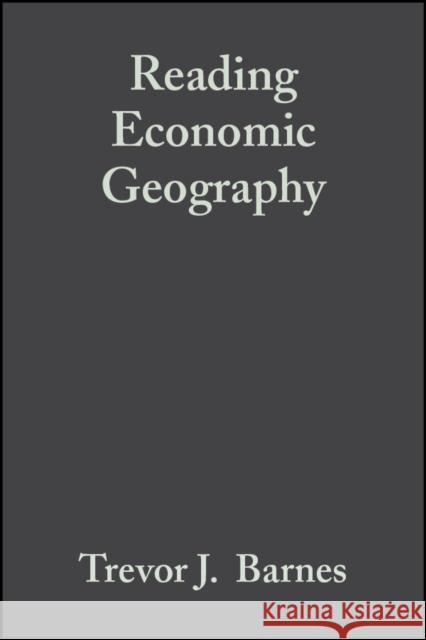Reading Economic Geography » książka



Reading Economic Geography
ISBN-13: 9780631235545 / Angielski / Miękka / 2003 / 496 str.
Reading Economic Geography
ISBN-13: 9780631235545 / Angielski / Miękka / 2003 / 496 str.
(netto: 224,70 VAT: 5%)
Najniższa cena z 30 dni: 234,00
ok. 30 dni roboczych.
Darmowa dostawa!
This reader introduces students to examples of the most important research in the field of economic geography.
- Brings together the most important research contributions to economic geography.
- Editorial commentary makes the material accessible for students.
- The editors are highly respected in their field.
Wydanie ilustrowane
"...represents some of the most important milestones in the development of contemporary economic geography....an essential reference point for beginners and specialists alike."
Gordon L. Clark, University of Oxford <!––end––>
"Brings to life the vibrancy, excitement and passion of economic geography. Crisp and provocative introductions divide the reader into five thematic sections, and the selections themselves will spark debate in the classroom. This will be required reading in any serious undergraduate geography program and a coveted resource for students at any level." Altha Cravey, University of North Carolina
"This is a wonderful showcase of the depth and breadth of the vibrant and unruly field that is economic geography. Although nominally an accompaniment to A Companion to Economic Geography, this book more than stands on its own merits as a critical journey through some of the most important moments and impulses of economic geography thinking." Andrew Leyshon, University of Nottingham
"...manages to combine a strong sense of the intellectual diversity of contemporary economic geography with an awareness of the key questions whic define the scope of the discipline." Keith Chapman, University of Aberdeen
Introduction: Reading Economic Geography.
Part I: Worlds of Economic Geography.
Editor′s Introduction: Paradigms Lost.
1. The Difference A Generation Makes. (David Harvey).
2. Industry And Space: A Sympathetic Critique Of Radical Research. (R. A. Sayer).
3. An Institutionalist Perspective On Regional Economic Development. (Ash Amin).
4. Refiguring The Economic In Economic Geography. (Nigel Thrift and Kris Olds).
5. The Economy, Stupid! Industrial Policy Discourse And The Body Economic. (J. K. Gibson–Graham).
Part II: Realms of Production.
Editor′s Introduction: Problematizing Production.
6. Is There A Service Economy? The Changing Capitalist Division Of Labor. (R. Walker).
7. Uneven Development: Social Change And Spatial Divisions Of Labour. (Doreen Massey).
8. Flexible Production Systems And Regional Development: The Rise Of The New Industrial Spaces In North America And Western Europe. (A. J. Scott).
9. Global–Local Tensions: Firms And States In The Global Space–Economy. (Peter Dicken).
10. The Politics Of Relocation: Gender, Nationality, And Value In A Mexican Maquiladora. (M. W. Wright).
Part III: Resource Worlds.
Editor′s Introduction: Producing Nature.
11. Nature, Economy And The Cultural Politics Of Theory: The ′War Against The Seals′ In The Bering Sea, 1870–1911. (Noel Castree).
12. Modernity And Hybridity: Nature, Regeneracionismo, And The Production Of The Spanish Waterscape, 1890–1930. (Erik Swyngedouw).
13. Oil As Money: The Devil′s Excrement And The Spectacle Of Black Gold. (Michael J. Watts).
14. Converting The Wetlands, Engendering The Environment: The Intersection Of Gender With Agrarian Change In The Gambia. (Judith Carney).
15. Nourishing Networks: Alternative Geographies Of Food. (Sarah Whatmore And Lorraine Thorne).
Part IV: Social Worlds.
Editor′s Introduction: Bringing In The Social.
16. Bringing The Qualitative State Into Economic Geography. (Phillip O′Neill).
17. Territories, Flows And Hierarchies In The Global Economy. (M. Storper).
18. Contesting Works Closures In Western Europe′s Old Industrial Regions: Defending Place Or Betraying Class? (Ray Hudson And David Sadler).
19. Class And Gender Relations In The Local Labor Market And The Local State. (Ruth Fincher).
20. Thinking Through Work: Gender, Power And Space. (Linda Mcdowell).
Part V: Spaces of Circulation.
Editor′s Introduction: From Distance To Connectivity.
21. The End Of Geography Or The Explosion Of Place? Conceptualizing Space, Place And Information Technology. (Stephen Graham).
22. Best Practice? Geography, Learning And The Institutional Limits To Strong Convergence. (M. Gertler).
23. Blood, Thicker Than Water: Interpersonal Relations And Taiwanese Investment In Southern China. (Y. Hsing).
24. From Registered Nurse To Registered Nanny: Discursive Geographies Of Filipina Domestic Workers In Vancouver, B.C. (Geraldine Pratt).
25. Discourse And Practice In Human Geography. (Erica Schoenberger).
Consolidated Bibliography.
Index.
Trevor J. Barnes is Professor of Geography at the University of British Columbia. His previous publications include
A Companion to Economic Geography (co–edited with Eric Sheppard, Blackwell Publishing, 2001).
Jamie Peck is Professor of Geography and Sociology at the University of Wisconsin–Madison. He is the author of Work–place (Guilford, 1996) and Workfare States (Guilford, 2001) and co–editor (with Henry Yeung) of Remaking the Global Economy: economic–geographical perspectives (Sage, 2003)
Eric Sheppard is Professor of Geography at the University of Minnesota. He is the author of The Capitalist Space Economy and A World of Difference and the co–editor with Trevor Barnes of A Companion to Economic Geography (Blackwell Publishing, 2001) and with Robert McMaster of Scale and Geographic Inquiry (Blackwell Publishing, 2003).Adam Tickell is Professor of Human Geography at the University of Bristol. He is editor of Transactions of the Institute of British Geographers and review editor of the Journal of Economic Geography.
This reader introduces students to examples of the most important research contributions to economic geography in recent years. In its structure and content, it mirrors
Blackwell’s Companion to Economic Geography and it can be used either to complement that volume or as a stand–alone text.
The reader opens with an editorial introduction, summarising the nature of contemporary economic geography, explaining the volume’s structure, and discussing what it means to take a critical approach to geography. The readings themselves are grouped into five sections, each of which is also prefaced by an editorial commentary, placing them within a critical framework. Suggestions for further reading are included to enable students to investigate particular topics further. The editors are all highly respected international authorities on economic geography.
1997-2026 DolnySlask.com Agencja Internetowa
KrainaKsiazek.PL - Księgarnia Internetowa









